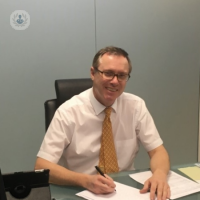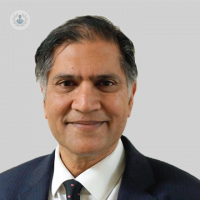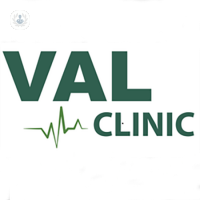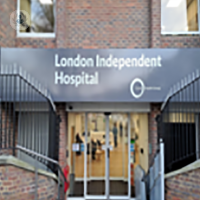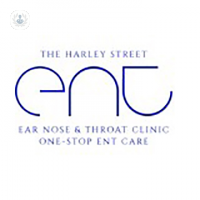What is vertigo?
Vertigo is not actually a condition in itself, but it is a symptom. It describes the feeling that everything around you is spinning, or that you are spinning yourself. In most cases, vertigo gets better by itself, but if it happens repeatedly or it keeps affecting you, it should be investigated.

‘Attacks’ of vertigo can last for just a few seconds, but they can also last longer, even for days or months in extreme cases.
What causes vertigo?
Vertigo is generally caused by problems with the inner ear, as the inner ear affects balance, causing the sensation of vertigo. Although sometimes the specific cause is unknown, some common problems with the inner ear causing vertigo include:
- Labyrinthitis (an infection of the inner ear)
- Ménière’s disease (a condition affecting the inner ear)
- Vestibular neuronitis (inflammation of the inner ear)
Certain head movements, certain medications, and migraines can also cause vertigo.

How is vertigo connected to BPPV (Benign Paroxysmal Positional Vertigo)?
BPPV is the most common cause of vertigo and it happens when small crystals in the inner ear's semi-circular canals break loose.
The ‘gravel’ shifts as the head moves - even slightly - and comes into contact with nerve-sensitive structures. In turn, it sends signals to the brain. The brain interprets this as the body, or room, spinning.
BPPV is also known as benign postural vertigo, positional vertigo and top-shelf vertigo.
How is vertigo diagnosed?
If vertigo is a result of BPPV, an ENT specialist can confirm vertigo is a symptom of this via a positional test, called a Dix-Hallpike manoeuvre.
Vertigo can be caused by other conditions. Doctors may also use instruments to magnify and examine the ear canal and eardrum. A doctor may examine your eye movements or may also get you to track an object from one point to another.
How is vertigo treated?
Vertigo generally gets better on its own. You can manage vertigo attacks using some of the following measures:
- Lying still in a quiet, dark room
- Moving slowly while you go about your activities
- Trying to relax (stress and anxiety make vertigo worse)
- Getting up slowly from a lying position (e.g when waking up)
- Sitting down immediately if you are feeling dizzy
- Not bending over when dropping something and picking it up. It is better to squat to pick objects up this way
- Not stretching your neck or making sudden head movements
If your vertigo keeps coming back, you should make an appointment with your doctor, who may refer you to a specialist to try and determine the cause. If the vertigo is caused by an infection, then antibiotics or other medication may be prescribed to clear up the infection. Your doctor may give you exercises to do when you experience vertigo to lessen symptoms.
If vertigo is experienced along with hearing loss, double vision, loss of vision, difficulty when speaking, or limb weakness/numbness, you should visit A&E.

How common is vertigo?
According to research by leading medical professionals, dizziness, including vertigo, affects about one in three women - and men - yearly. About a quarter of dizziness cases in patients are the result of vestibular vertigo, and prevalence rises with age. It is about two to three times higher in women than in men.
Which specialist treats vertigo?
Generally vertigo clears up on its own, but if you are having repeated attacks, your GP may refer you to an ENT doctor (otolaryngologist).
10-14-2015 04-24-2024Vertigo
Mr Richard Irving - Otolaryngology / ENT
Created on: 10-14-2015
Updated on: 04-24-2024
Edited by: Carlota Pano
What is vertigo?
Vertigo is not actually a condition in itself, but it is a symptom. It describes the feeling that everything around you is spinning, or that you are spinning yourself. In most cases, vertigo gets better by itself, but if it happens repeatedly or it keeps affecting you, it should be investigated.

‘Attacks’ of vertigo can last for just a few seconds, but they can also last longer, even for days or months in extreme cases.
What causes vertigo?
Vertigo is generally caused by problems with the inner ear, as the inner ear affects balance, causing the sensation of vertigo. Although sometimes the specific cause is unknown, some common problems with the inner ear causing vertigo include:
- Labyrinthitis (an infection of the inner ear)
- Ménière’s disease (a condition affecting the inner ear)
- Vestibular neuronitis (inflammation of the inner ear)
Certain head movements, certain medications, and migraines can also cause vertigo.

How is vertigo connected to BPPV (Benign Paroxysmal Positional Vertigo)?
BPPV is the most common cause of vertigo and it happens when small crystals in the inner ear's semi-circular canals break loose.
The ‘gravel’ shifts as the head moves - even slightly - and comes into contact with nerve-sensitive structures. In turn, it sends signals to the brain. The brain interprets this as the body, or room, spinning.
BPPV is also known as benign postural vertigo, positional vertigo and top-shelf vertigo.
How is vertigo diagnosed?
If vertigo is a result of BPPV, an ENT specialist can confirm vertigo is a symptom of this via a positional test, called a Dix-Hallpike manoeuvre.
Vertigo can be caused by other conditions. Doctors may also use instruments to magnify and examine the ear canal and eardrum. A doctor may examine your eye movements or may also get you to track an object from one point to another.
How is vertigo treated?
Vertigo generally gets better on its own. You can manage vertigo attacks using some of the following measures:
- Lying still in a quiet, dark room
- Moving slowly while you go about your activities
- Trying to relax (stress and anxiety make vertigo worse)
- Getting up slowly from a lying position (e.g when waking up)
- Sitting down immediately if you are feeling dizzy
- Not bending over when dropping something and picking it up. It is better to squat to pick objects up this way
- Not stretching your neck or making sudden head movements
If your vertigo keeps coming back, you should make an appointment with your doctor, who may refer you to a specialist to try and determine the cause. If the vertigo is caused by an infection, then antibiotics or other medication may be prescribed to clear up the infection. Your doctor may give you exercises to do when you experience vertigo to lessen symptoms.
If vertigo is experienced along with hearing loss, double vision, loss of vision, difficulty when speaking, or limb weakness/numbness, you should visit A&E.

How common is vertigo?
According to research by leading medical professionals, dizziness, including vertigo, affects about one in three women - and men - yearly. About a quarter of dizziness cases in patients are the result of vestibular vertigo, and prevalence rises with age. It is about two to three times higher in women than in men.
Which specialist treats vertigo?
Generally vertigo clears up on its own, but if you are having repeated attacks, your GP may refer you to an ENT doctor (otolaryngologist).


What causes balance problems?
By Miss Victoria Alexander
2024-12-14
The ability to balance depends on various factors. This includes on how well the brain, nerves, eyes, muscles and joints, function, as well as the vestibular system, which is the group of structures behind the ear drum. Leading consultant adult & paediatric ENT surgeon Miss Victoria Alexander looks at the most common causes of balance problems in connection to the vestibular system, their symptoms and treatment. See more


BPPV: how is the ear condition diagnosed and treated?
By Professor Owen Judd
2024-12-14
BPPV is one of the common types of vertigo, an ear condition that causes the false sensation of spinning and feelings of giddiness. Our ear specialist Professor Owen Judd explains more about the disorder, how it's diagnosed and the treatment options. See more


What is vestibular migraine?
By Professor Owen Judd
2024-12-14
Vestibular migraine is a condition in which you may experience repeated episodes of dizziness and vertigo. You may not necessarily experience headaches at the same time of these symptoms, however. Professor Owen Judd, a top ENT surgeon with a special interest in neurotology (disorders of the brain and ear), explains what vestibular migraine is and how it can be treated. See more
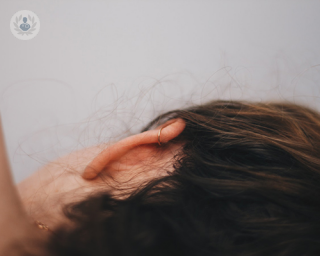

Cholesteatoma: why is treatment necessary?
By Mr Abhijeet Parikh
2024-12-14
If you have the ear infection cholesteatoma, it's important to get it treated right away to stop any further complications, such as hearing loss. We asked our expert otolaryngologist Mr Abhijeet Parikh to explains why it needs to be treated. See more
Experts in Vertigo
-
Mr Nicholas Eynon-Lewis
Otolaryngology / ENTExpert in:
- Blocked nose
- Vertigo
- Sinusitis
- Septorhinoplasty
- Tinnitus
- Voice disorders
-
Mr Richard Irving
Otolaryngology / ENTExpert in:
- Facial paralysis
- Vertigo
- Glue ear
- Deafness
- Acoustic neuroma
-
Professor Manohar Bance
Otolaryngology / ENTExpert in:
- Cochlear Implants
- Hearing loss
- Vertigo
- Ménière's disease
- Middle ear surgery
- Otitis
-
Mr Angus Waddell
Otolaryngology / ENTExpert in:
- Middle ear surgery
- Vertigo
- Dizziness
- Otology
- Tinnitus
- Hearing loss
-
Mr S James Quinn
Otolaryngology / ENTExpert in:
- Otology
- Hearing loss
- Ear infection
- Dizziness
- Vertigo
- Paediatric ENT
- See all

VAL Clinic
VAL Clinic
39 Frederick Rd, Rainham, RM13 8NJ
No existe teléfono en el centro.
By using the telephone number provided by TOP DOCTORS, you automatically agree to let us use your phone number for statistical and commercial purposes. For further information, read our Privacy Policy
Top Doctors

The London Independent Hospital - part of Circle Health Group
The London Independent Hospital - part of Circle Health Group
1 Beaumont Square, Stepney Green
No existe teléfono en el centro.
By using the telephone number provided by TOP DOCTORS, you automatically agree to let us use your phone number for statistical and commercial purposes. For further information, read our Privacy Policy
Top Doctors

The Harley Street ENT Clinic
The Harley Street ENT Clinic
109 Harley Street, London, W1G 6AN
No existe teléfono en el centro.
By using the telephone number provided by TOP DOCTORS, you automatically agree to let us use your phone number for statistical and commercial purposes. For further information, read our Privacy Policy
Top Doctors
-
VAL Clinic
39 Frederick Rd, Rainham, RM13 8NJ, East LondonExpert in:
- Cardiology
- Bariatric Surgery
- Orthopaedic surgery
- Dermatology
- Obstetrics and Gynaecology
- Internal medicine
-
The London Independent Hospital - part of Circle Health Group
1 Beaumont Square, Stepney Green, East LondonExpert in:
- Cataracts
- Bariatric Surgery
- Maxillofacial Surgery
- Neurological spinal surgery
- Orthopaedic surgery
- Orthopaedic spinal surgery
-
The Harley Street ENT Clinic
109 Harley Street, London, W1G 6AN, Central LondonExpert in:
- Blocked nose
- endoscopy
- Hearing Implants
- Ear infection
- Hearing loss
- Acid reflux
- See all
- Most viewed diseases, medical tests, and treatments
- Visual impairment
- Diabetic retinopathy
- Retina
- Visual stress (Meares-Irlen syndrome)
- Presbyopia
- Nystagmus
- Myopia
- Hyperopia (farsightedness)
- Eye examination
- Demodex

